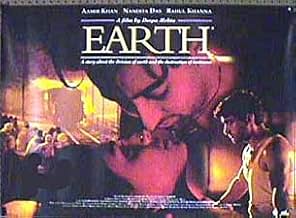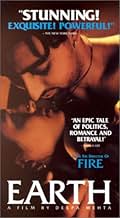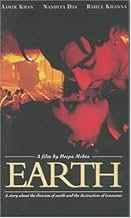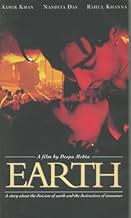यह 1947 की बात है और भारत और पाकिस्तान के बीच सीमा रेखा तैयार की जा रही है. एक युवा लड़की त्रासदी का गवाह बनती है क्योंकि उसकी आया (नैनी) दो पुरुषों के प्यार और राजनीतिक और धार्मिक हिंसा की ... सभी पढ़ेंयह 1947 की बात है और भारत और पाकिस्तान के बीच सीमा रेखा तैयार की जा रही है. एक युवा लड़की त्रासदी का गवाह बनती है क्योंकि उसकी आया (नैनी) दो पुरुषों के प्यार और राजनीतिक और धार्मिक हिंसा की बढ़ती समस्या के बीच फंस गई है.यह 1947 की बात है और भारत और पाकिस्तान के बीच सीमा रेखा तैयार की जा रही है. एक युवा लड़की त्रासदी का गवाह बनती है क्योंकि उसकी आया (नैनी) दो पुरुषों के प्यार और राजनीतिक और धार्मिक हिंसा की बढ़ती समस्या के बीच फंस गई है.
- पुरस्कार
- 3 जीत और कुल 2 नामांकन
- Hariya
- (as Raghuvir Yadav)
- …
- Butcher
- (as Pavan Malhotra)
फ़ीचर्ड समीक्षाएं
As Parsees, India's "invisible" people, Lenny's wealthy family is supposedly sheltered from the growing conflict by an ever-fragile 'neutrality'. Lenny's naïvety is used quite effectively to endear her to the viewer. Her innocence makes the tragedy of Partition even more profound. The events occurring are incomprehensible to Lenny; her naïvety is best illustrated in the opening scene, in which she breaks a plate and, utterly perplexed, enquires "Can one break a country?" The story, though narrated by Lenny at beginning and end, does not always seem to be from her viewpoint and one doubts if she could accurately be described as the protagonist.
Lenny's Hindu ayah, or nanny, appears to be more of a focus. Shanta (Nandita Das) is beautiful, and is surrounded by a circle of male admirers, and, in particular, two Muslims suitors who vie for her affection. One is the poetic Dil Navaz (Aamir Khan), or as Lenny calls him, Ice Candy Man, and the other is a masseuse, Hassan (Rahul Khanna). Although it initially seems that it is with Dil Navaz that her affections lie, Hassan proves to be her true love, much to the surprise of the viewer. Whilst it is never really shown why Dil Navaz's courtship fails, the viewer could infer that it he lacked a certain gentlemanliness and that he possessed a certain darkness. What is clear is the love that Hassan has for Shanta; a love that is realised in a beautifully handled love-scene. Shanta is a woman for which he would convert to Hinduism and risk his life.
Mehta does not shy away from depicting the savagery of the conflict and the film possesses some extremely powerful moments. One in particular is the debilitating and horrifically gruesome 'de-limbing' of a man caught in the fury of a mob. Another, arguably most powerful, scene is the discovery of a trainload of massacre victims by Dil Navaz, among them his sisters, and sacks of severed breasts. The climax of the movie is a devastating illustration of the consequences of unrequited love. In the scene, we see the supposed protection of the Parsees crumble as an enraged Muslim mob arrives seeking Hindus and Sikhs. Shanta, a Hindu, is hidden in the house, as the mob questions workers who have converted from Hindu and Sikh to Muslim and Christian and then demands Shanta. Dil Navaz, played deftly by Aamir Khan, appears from the crowd, and appearing a "hero", deceives Lenny into revealing Shanta's whereabouts who is then dragged away screaming, and presumably murdered.
Based on the novel "Cracking India", by Bapsi Sidhwa (who co-adapted the script), the film translate to screen in a rich, flowing melodrama. It is strong in symbolism and the obvious motif of 'breaking' (plates, persons, dolls and relationships) works to keep the Partition in frame-of-mind. Mehta has created a sensual piece of dazzling colours that correspond with the moment in time in the first half it is joyful and organic, in the second it is dark and ominous. The accompanying soundtrack, by A.R. Rahman, is effective and appropriate. However, the film sits awkwardly betwixt the style of 'Bollywood' and that of Hollywood. It has, one could argue, obviously been made with a Western audience in mind, and consequently, does not set to be historically informative. Nevertheless, it is an effective piece that does not befuddle the viewer, and provides insight into how people were directly affected by the Partition, an event that still reverberates today.
(S. R. Watson, Flinders University, Adelaide)
Most of the comments here on IMDb are positive and I agree with these reviews. However, for me the cynicism of the critics was unfounded because I was not expecting the usual Hollywood movie. If you cannot relate to this film in a positive way then I suppose that you have not traveled much and have not lived in other cultures, at least not in Asia. This is not an American film made for an American audience.
This is very much an adult film for a sensitive and mature audience. It is certainly not for those seeking the usual thrills and spills and formula love stories. We are given a look at a very important and prominent country being split up by a colonial power, and how this political decision affects millions of people in some of the most awful manners. A million lost their lives! The tension between India and Pakistan still haunts us all ! So don't expect a nice and sweet film, although there were some beautiful scenes of childhood innocence and the romance of young lovers.
The symbolism is rich. At the start we see a dinner table with the main groups of people represented in the formation of Pakistan: English, Sikh, Muslim, Hindu, Parsee. Throughout the film Lenny Baby represents the innocence and naivety which so many people remain in during geopolitical processes. When it is this young girl's birthday, she can find no one who cares. Her birthday is the same day of the Pakistan-India split, and the symbolism is obvious. She then finds a Muslim refugee boy whose mother was brutally killed by Hindus. He asks her if she is a Hindu and when she replies "no" she also asks if he wants some cake. "Cake? What is cake?" Lenny-the-Naive is baffled, and again the symbolism is obvious. So many of us cannot really relate to the plight of refugees. What happens to this innocent and naive position at the end? We are stunned to see the results. Naivety leads Beauty and Love to a terrible fate. Innocence is tragically deceived. It wasn't until my second viewing of this film that I saw the many symbolic references. Watch the film with this perspective and you will see through the cynicism such as writer "Pass the pappadom" makes elsewhere on this page.
One symbolic reference that I am not sure if I understand was that of the Sikh man and his family, hiding from the Muslim killer mob. He was such a sincere and gentle man, and even his dagger raised in defense did not detract from his positive qualities. Was he portrayed in this way because the Sikhs had too much 'bad press' about their warrior ways? Were the Sikhs ineffective in protecting themselves during the division?
A friend of mine told me that he cried all the way home after seeing this film. He is 46 years old and not a weak and overly sensitive person. My wife and I were quite emotionally moved by this film, and we cannot relate to the film critics that say otherwise. By the way, my wife lived in India for a year and she loved seeing the various scenes of everyday Indian life, so you may enjoy the film just for the sake of seeing people living life outside of Hollywood America.
One last symbolic reference to ponder was the touching romantic scene between the two lovers amidst the ancient ruins. Here we see a Muslim man saying that he would convert to Hinduism so that the marriage would be possible. All they needed to do is to leave to live in the newly divided India. The ancient ruins indicate the past, but unfortunately the lovers return to the present.
This is a film that I will remember for a long time. I highly recommend that you see it, if you don't mind a serious film about major issues, seen from a non-American perspective.
Director - writer Deepa Mehta deserves much credit for depicting the complexities of one of the world's worst tragedies with diplomatic balance, not placing blame on any one group but yet revealing the errors and brutality that each group made.
The film, based on the autobiographical novel "Cracking India" by Bapsi Sidhwa, concentrates on the effect the civil turmoil has on personal relationships. Somehow, politics brings out the worst in everyone; submerged resentments and trivial jealousies fuel shocking atrocities. Even innocent little Lenny manages to act badly, despite her "neutral" status.
Despite the presence of at least one "Bollywood" star (Aamir Khan) the director, Deepa Mehta, has not made a crowd-pleaser here. There are survivors, but no surviving heroes. The story unfolds first at a leisurely pace, gaining speed as independence day approaches and ends in a montage of mobs, destruction and violence. Every scene is beautifully composed and almost every part sensitively played. Maia Sethna as Lenny, Nandita Das as her beautiful young nanny Shasta , Rahul Khanna as Hasan, Shastas' lover and Aamir Khan as Dil Navaz the 'ice candy man" are all stand-outs. While not actually filmed in Lahore (the authorities there were not keen, it seems) the film evokes superbly a hot, ancient and troubled land. The whole style of the film is quite different from anything to emerge out of Hollywood and that alone makes it worth seeing.
It is suggested in the film that perhaps the villain here was that old standby, human nature. It does seem, though, that the British India administration (represented here only by one drunken official at a dinner party) and particularly the British government, had a lot to answer for. The twenty-five years or so leading up to independence were marked by the failure of successive conservative British governments to allow a truly responsible democracy to emerge in India when it was quite clear by the end of World War One that independence was inevitable. (The white Dominions on the other hand were practically pushed into independence.) Then, when the post-war Labour government decided to grant independence it did so with unseemly and disastrous haste. No, the chief villain was perfidious Albion, or rather British "muddling through". Here we get a beautiful, moving, elegiac account of the victims of bad colonial policy driven by racism and unenlightened self-interest.
The score by A.R. Rahman is a powerful blend of Indian and western film music, lightening the joyous moments (such as the kite-flying scene) and deepening the foreboding in other scenes (such as the train of death).
The film has at its heart the year 1947 when India was given its independence from Great Britain and at the same time bifurcated into two countries - India and Pakistan. The story opens with a tranquil park picnic in Lahore where friends - Hindu, Muslim, Sikh, Parsee - while away the afternoon in camaraderie. Only slight overtones of edgy topics about religion mar the conversation until the topic focuses on the incipient split of the country into two countries. Each of the friends represents each of the religious sects and it is how these differences, at once unimportant to friendship, end up in separating the friends under the influence of the devastation of bloodshed that follows the division of the country and the displacement of millions of people, all under the guise of independence.
There is a strong love story, a committed crippled child who experiences all of the happiness and subsequent tragedy that is to follow and the story ends with some words of wisdom by the grown little girl reflecting on choices made, and other sidebars that maintain interest at every frame.
The acting is first rate from a beautiful cast and Mehta's direction makes this tale of change whir by the viewer. For those not educated in the differences of the four religious sects of Hindu, Parsee, Muslim, and Sikh the tale can become confusing: would that Mehta would have included a discussion about the film in an added feature the way she helped us understand the plight of widows in WATER. And the subtitles unfortunately do not translate the English spoken portions of the film, portions that while very important to the story are nearly indecipherable due to the accents of the characters speaking.
But these are minor quibbles in a film that pleads for repeated viewings, so beautiful is the movie and so very important is the message. Highly Recommended.
क्या आपको पता है
- ट्रिवियाAamir Khan's first negative role. He went on to receive much critical acclaim for his performance.
- भाव
Older Lenny: I was eight years old, living in Lahore in March of 1947, when the British Empire in lndia started to collapse. Along with talks of lndia's independence from Britain came rumblings about its division into two countries, Pakistan and lndia. Hindus, Muslims, and Sikhs who had lived together as one entity for centuries. suddenly started to clamor for pieces of lndia for themselves. The arbitrary line of division the British would draw to carve up lndia in August of 1947 would scar the Subcontinent forever.
- कनेक्शनFeatured in Women Make Film: A New Road Movie Through Cinema (2018)
टॉप पसंद
- How long is Earth?Alexa द्वारा संचालित
विवरण
बॉक्स ऑफ़िस
- US और कनाडा में सकल
- $4,24,798
- US और कनाडा में पहले सप्ताह में कुल कमाई
- $42,449
- 12 सित॰ 1999
- दुनिया भर में सकल
- $4,24,798
इस पेज में योगदान दें



































